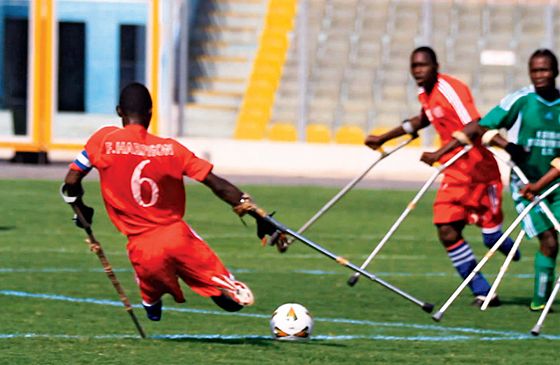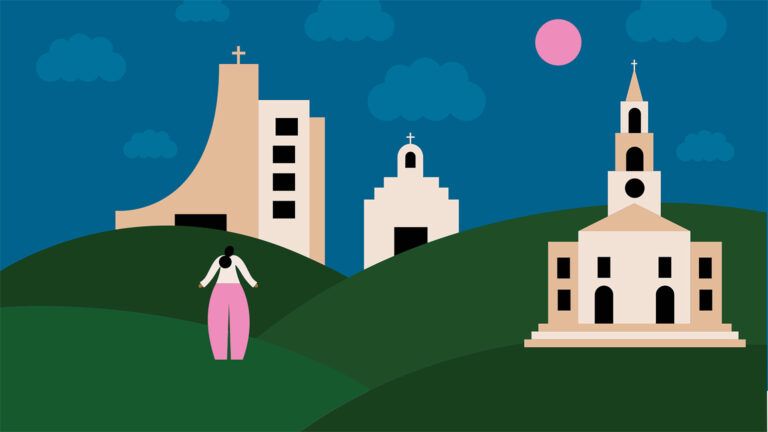I sat on a makeshift wooden bench on the sidelines of the soccer field, my camera bag slung over my shoulder. Player number 14–his red-and-white Liberia jersey bright in the sunlight–kicked the ball to a teammate across the stretch of sand they used as a field.
It was like any other soccer game, except the players on this field were all amputees.
Men on crutches shooting goals. Goalies blocking shots with one arm. I’d flown to Liberia to make a documentary about the Lone Stars, Liberia’s amputee soccer team. My first attempt at a feature-length film. I’d quit my job to do this project.
But after three days of sitting on the edge of the field, I wondered if I’d made a huge mistake. No one on the team seemed interested in talking. They paid zero attention to me or to Evan, my friend and collaborator. We might as well have been invisible.
“Maybe they’re just focused on the game,” Evan suggested. So we waited for a pause in the action, then tried to break the ice. We explained how we’d read about the Lone Stars, how we wanted to show the world what they do. “Your story is inspiring,” I said.
The players stared at us, their expressions giving nothing away, then crutched back onto the field. My heart sank. We’d dropped everything to be here, and these guys wanted nothing to do with us. Why?
Had I really thought I could do this? I hadn’t trained to be a filmmaker. I was a philosophy major in college. But film was my passion. I’d shot a few short pieces and posted them on YouTube, and after graduation I found work at a small production studio in New York.
Meanwhile, friends who’d studied film had big-time connections and were already making movies of their own. I wanted to do that too. But what would my movies be about? I wanted to do something meaningful.
Then I read a book about soccer in Africa and came across a passage about the Lone Stars, a group of men maimed in Liberia’s bloody civil war. Improbably, they’d come together and formed a team. They’d competed in the biennial Cup of African Nations Amputee Football championship and in 2009 they’d won.
I wondered how they could play at that level on crutches. I poked around online to find out more.
The members of the Lone Stars had vastly different histories, all of them violent. Some were ex-soldiers who had lost their limbs in combat. Others were innocent victims caught in the crossfire. Society shunned them because of their injuries. Now they were champions. Incredible.
How had they moved beyond the violence and hatred of their past? How had they avoided the trap of bitterness and become teammates? God was moving in these men’s lives in a way that was truly inspiring. It was a story the world needed to hear.
“We have to do it,” Evan said when I mentioned making a documentary.
“But where are we going to get the money?” I asked. We’d have to quit our jobs, borrow cameras and somehow scrape the money together to cover initial costs, like our plane tickets. If the project picked up steam, maybe we could do a fund-raising campaign. We’d have to get the team’s cooperation.
The more I thought about the Lone Stars, the more I wanted to tell their story. Evan and I cashed in our savings, maxed out our credit cards and arrived in Monrovia, Liberia’s capital, full of hope. And naïveté, as it turned out.
After three days watching on the sidelines, I had to face facts: This had all been one giant mistake. The Lone Stars weren’t interested. I’d have to crawl home empty-handed. I felt like such a failure.
At one point, the ball rolled out of bounds just a few feet away from us. When I went to kick it back, a player scooped it up without even looking at me.
We needed a way to get through to them. The next day Evan and I brought the team fresh water, a rare commodity in Liberia. The men thanked us, then went right back to playing. Nothing. God, we can’t go home like this. We came all this way. You’ve got to help us out!
After practice, one player sauntered over to our bench. Number 14. He flashed a tentative smile.
“My name is Richard,” he said, holding out his hand. “Thank you for the water. You’ve been sitting out here for days. What do you guys want from us?”
I told him about my love of soccer and my fascination with their team. My belief that the world needed to know their story.
Richard laughed. “We’ve talked to journalists before. They take what they want and then disappear. What makes you different?”
I fumbled for words. Who were we, a pair of 20-something kids? Evan was silent too. “Look, we’re not journalists,” I said finally. “We borrowed money just to get here because we think you have a great story. That’s all we’ve got.”
He paused and looked us over, considering. Then he nodded. “Come tomorrow,” he said, and walked away.
The Lone Stars finally gave us permission to film their practice. We even got a couple of their stories on film. Richard, for example, wasn’t an ex-combatant; he was a casualty of war. He was only three years old when he lost his left leg.
Another player, Dennis, had entered the Liberian Army during peacetime. But within a year, rebel forces rose up, overran his unit and forced him to join. He fought as a rebel soldier for years before losing a leg in combat.
Evan and I got enough footage to make a fund-raising reel. Before we said goodbye, we warned the Lone Stars. No guarantees. But we promised to do our best to get the film made.
Back in the States, we spent the next few months raising enough money to continue our project. On a shoestring budget, we made it back to Liberia in November, just in time for the 2011 Cup of African Nations championship.
This time, the players greeted us with smiles–they knew we were for real. They even invited us to their homes for meals and introduced us to their families. It was the kind of trust we had dreamed of. We traveled with the Lone Stars to Accra, Ghana, and covered their quest for the 2011 trophy.
In match after match the team prevailed. Evan and I filmed them, rooted for them, believed in them. I watched these courageous players–many of them former enemies–come together as a team. What was their secret? How did they forgive each other and move beyond the brutal past?
“Only God knows why things are the way they are,” Richard said. “Maybe he has brought us together to speak to the people of Liberia, to show them who we are and what we can do. We need to reconcile with the past, not dwell on it. We need trust and faith to move forward.”
The Lone Stars made it all the way to the final match, against Ghana. After a dismal first half, they turned the game around. They won 4-3. Watching them celebrate was quite a sight. They danced around the field, ecstatic, singing songs and sending prayers heavenward.
I filmed it all. They’re champions to me not because of their gold cups but because the obstacles they faced–physical disabilities, discouragement, losing loved ones, rejection–were no match for their spirit.
They moved ahead, finding this new purpose for themselves. And always forgiving, through faith, playing and praying. That was their message to the world.
Watch a trailer for Aubrey's documentary!
Download your FREE ebook, True Inspirational Stories: 9 Real Life Stories of Hope & Faith.





